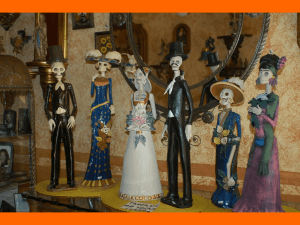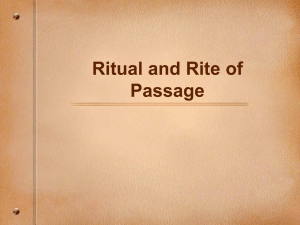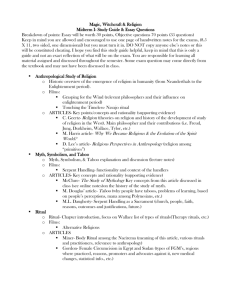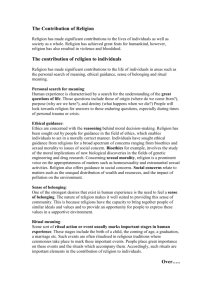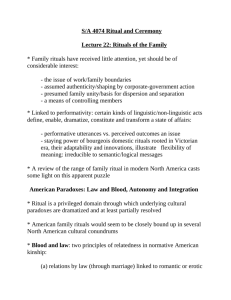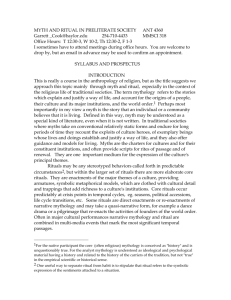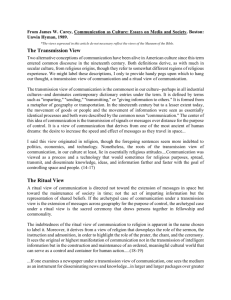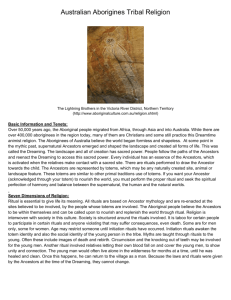“Magic” of Masonic Ritual
advertisement
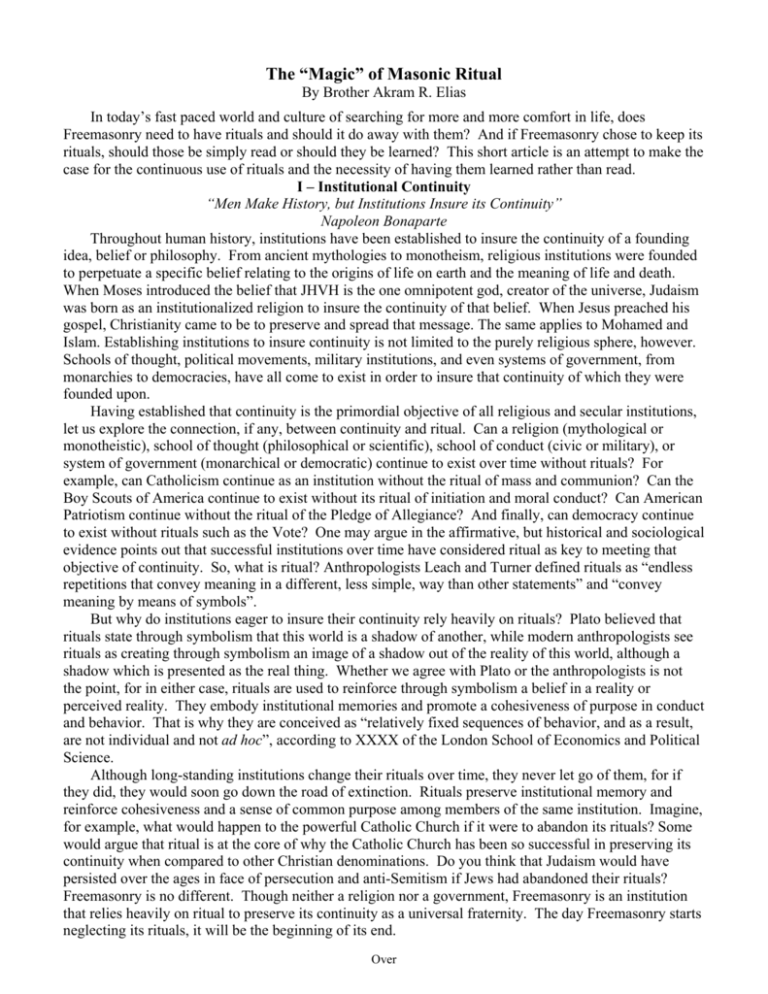
The “Magic” of Masonic Ritual By Brother Akram R. Elias In today’s fast paced world and culture of searching for more and more comfort in life, does Freemasonry need to have rituals and should it do away with them? And if Freemasonry chose to keep its rituals, should those be simply read or should they be learned? This short article is an attempt to make the case for the continuous use of rituals and the necessity of having them learned rather than read. I – Institutional Continuity “Men Make History, but Institutions Insure its Continuity” Napoleon Bonaparte Throughout human history, institutions have been established to insure the continuity of a founding idea, belief or philosophy. From ancient mythologies to monotheism, religious institutions were founded to perpetuate a specific belief relating to the origins of life on earth and the meaning of life and death. When Moses introduced the belief that JHVH is the one omnipotent god, creator of the universe, Judaism was born as an institutionalized religion to insure the continuity of that belief. When Jesus preached his gospel, Christianity came to be to preserve and spread that message. The same applies to Mohamed and Islam. Establishing institutions to insure continuity is not limited to the purely religious sphere, however. Schools of thought, political movements, military institutions, and even systems of government, from monarchies to democracies, have all come to exist in order to insure that continuity of which they were founded upon. Having established that continuity is the primordial objective of all religious and secular institutions, let us explore the connection, if any, between continuity and ritual. Can a religion (mythological or monotheistic), school of thought (philosophical or scientific), school of conduct (civic or military), or system of government (monarchical or democratic) continue to exist over time without rituals? For example, can Catholicism continue as an institution without the ritual of mass and communion? Can the Boy Scouts of America continue to exist without its ritual of initiation and moral conduct? Can American Patriotism continue without the ritual of the Pledge of Allegiance? And finally, can democracy continue to exist without rituals such as the Vote? One may argue in the affirmative, but historical and sociological evidence points out that successful institutions over time have considered ritual as key to meeting that objective of continuity. So, what is ritual? Anthropologists Leach and Turner defined rituals as “endless repetitions that convey meaning in a different, less simple, way than other statements” and “convey meaning by means of symbols”. But why do institutions eager to insure their continuity rely heavily on rituals? Plato believed that rituals state through symbolism that this world is a shadow of another, while modern anthropologists see rituals as creating through symbolism an image of a shadow out of the reality of this world, although a shadow which is presented as the real thing. Whether we agree with Plato or the anthropologists is not the point, for in either case, rituals are used to reinforce through symbolism a belief in a reality or perceived reality. They embody institutional memories and promote a cohesiveness of purpose in conduct and behavior. That is why they are conceived as “relatively fixed sequences of behavior, and as a result, are not individual and not ad hoc”, according to XXXX of the London School of Economics and Political Science. Although long-standing institutions change their rituals over time, they never let go of them, for if they did, they would soon go down the road of extinction. Rituals preserve institutional memory and reinforce cohesiveness and a sense of common purpose among members of the same institution. Imagine, for example, what would happen to the powerful Catholic Church if it were to abandon its rituals? Some would argue that ritual is at the core of why the Catholic Church has been so successful in preserving its continuity when compared to other Christian denominations. Do you think that Judaism would have persisted over the ages in face of persecution and anti-Semitism if Jews had abandoned their rituals? Freemasonry is no different. Though neither a religion nor a government, Freemasonry is an institution that relies heavily on ritual to preserve its continuity as a universal fraternity. The day Freemasonry starts neglecting its rituals, it will be the beginning of its end. Over II – Ritual and the Candidate Having established the importance of ritual for the purpose of continuity, we need to address whether Masonic ritual should be read or learned. In Masonry, ritual is always present whether for the purpose of conducting lodge business or the conferral of degrees. Let us first focus on the conferral of degrees. No matter what the degree in question is, the candidate for that degree undergoes a powerful “moral drama”. The more powerful the impression on the candidate the more impact it will have on his conscience. When ritual is read during degree conferral, the “drama” is weakened to the point that it becomes an intellectual exercise at best. When recited however, it becomes a sequence of acts in a living “drama” with the candidate being its primary witness. The impact there is tremendous. Can you imagine yourself attending a Shakespeare’s theatrical performance where the actors would read their lines instead of acting them through recital? How disappointed would you be? A candidate to a Masonic degree would feel the same disappointment if he were deprived the aura and mysticism of that powerful drama embedded in that degree. I cannot describe to you in words the feelings I had every time I received a degree at Potomac Lodge No. 5, my mother lodge in the District of Columbia. I truly felt that I was going through something very special and unique. No reading could ever convey the power of those degrees and cause such emotional reaction. III – Ritual and the Mason: True Alchemy “Could we know what Men are most apt to Remember, we might know what They are most apt to Do” Halifax Having addressed the powerful impact that recited ritual has on the candidate for Masonic degrees, we need now to focus on the more complex question of the importance of learned ritual to the individual brother Mason. In other words, why should a Mason learn his ritual rather than simply read it? What difference does it make? The answer to this question is in two parts. First, the officers of a lodge would have to learn the ritual in order to put together the necessary degree work for candidates in the manner we discussed earlier. But since going through the chairs is conceived as a process of maturity for the individual Mason in search of light, then each and every brother would need at some time to be proficient in the ritual. But even if a Mason chooses not to seek the East in lodge, his search for further light would greatly benefit from learning the ritual. Let me explain. We know that rituals, through symbolism, make lasting impressions upon a man’s consciousness. What does this really mean? Tim Schallice, MRC Applied Psychology Unit at Cambridge, sheds some light on the importance of consciousness: “a variety of empirical phenomena, such as the blindsight syndrome, indicate that if there is to be a scientific understanding of human thought, consciousness cannot be dismissed as a mere epiphenomenon. On the contrary, it relates to some very central aspect of the human information-processing system”. In other words, consciousness plays a paramount role in influencing physical behavior, and if one were to alter his own consciousness, he could ultimately alter his behavior. Harry M. Johnson of the University of Illinois says the following on the meaning of symbol: “properly speaking, a symbol stands for a concept, general or particular. The person, thing, category, idea or event evoked as a concept may be only imaginary but may, along with other symbolized meanings in complex messages, bring about thoughts, feelings, or intentions in the decoders of the symbol.” Indeed, symbolism works very well on intuition by triggering feelings which in turn allow the individual to comprehend at a glance. Pascal put it best when he said: “those who are accustomed to reason from first principles do not understand matters of feeling at all, because they look for first principles and are unable to comprehend at a glance”. In other words, a man through ritual can affect his consciousness by letting symbols affect his senses and activate his intuition; and an altered state of consciousness ultimately expresses itself in tangible actions. In Freemasonry, that is exactly the purpose of ritual. As Masons we believe that Freemasonry takes good men and makes them better. Indeed, it is through its richly moral rituals that Freemasonry makes such a deep and lasting impact on the individual brother. By altering one’s own level of consciousness, a good man can make himself better through a gradual process of internal change. This is true alchemy and therefore the most important aspect of Masonic ritual. 07/01/2009
